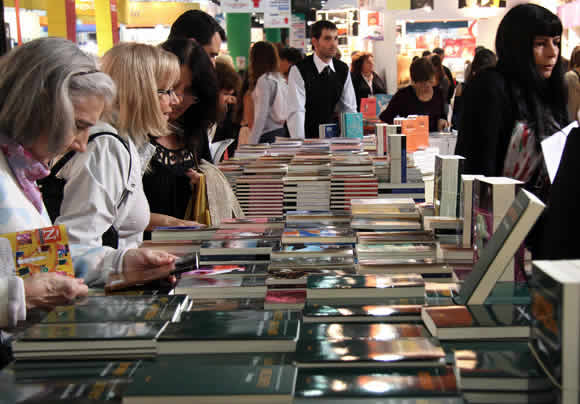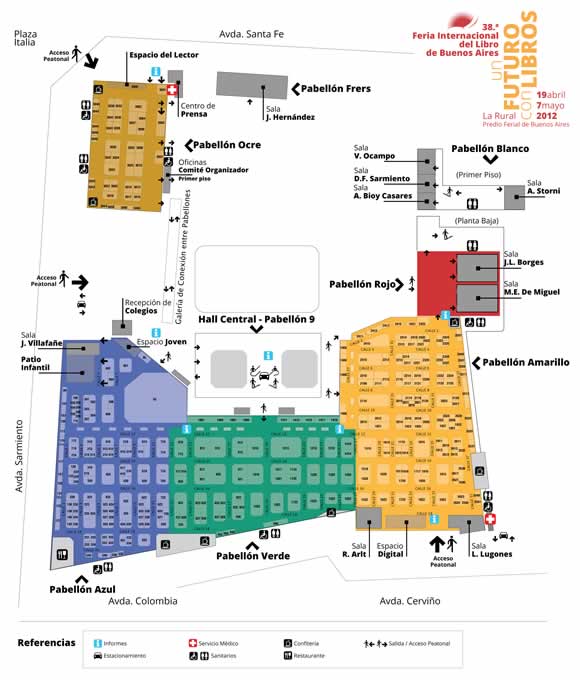The Buenos Aires International Book Fair (Feria del Libro) is one of the top five book expos in the world.
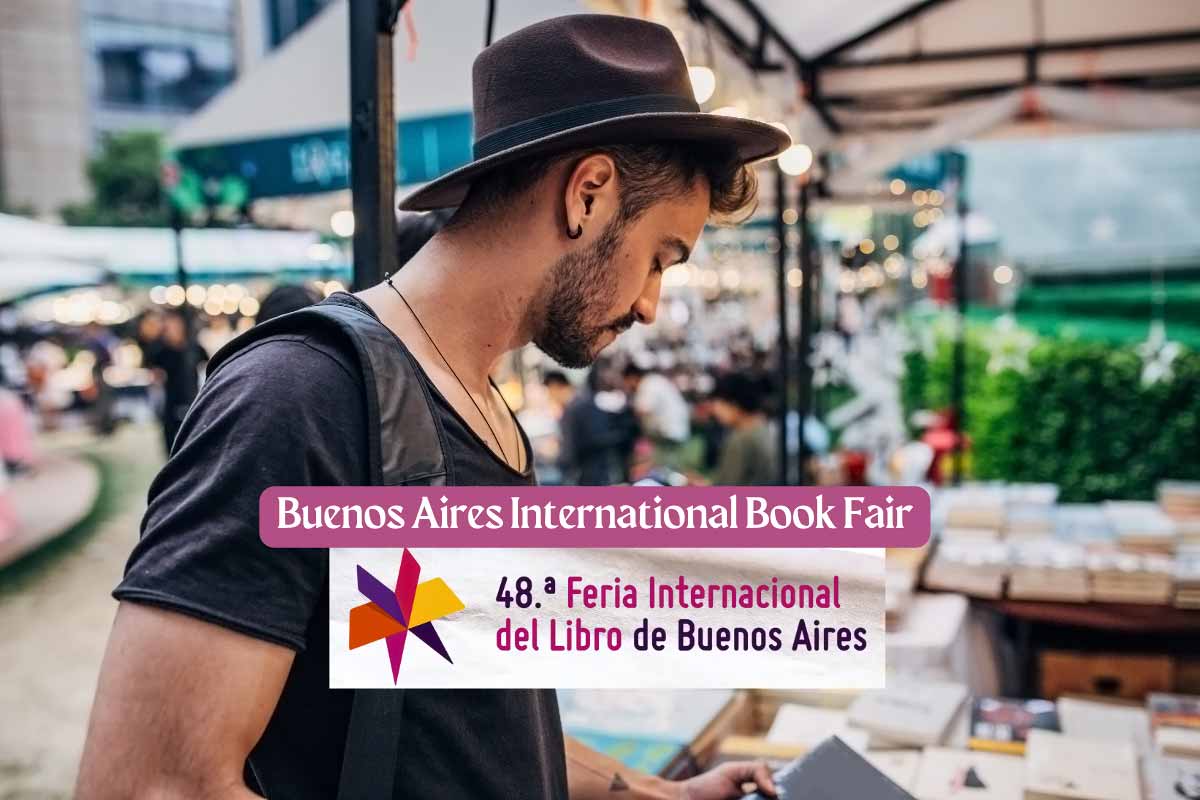
This annual celebration of the Spanish-language literary universe unfolds in Palermo during three weeks each April.
It is the most important literary event in the Spanish-speaking world, with a line-up of cultural programs including conferences, readings, workshops and book presentations.
It is hosted by the Fundación El Libro, a non-profit birthed from the Argentine Society of Writers (SADE).
This year’s program promises more than 2000 activities for readers, editors, librarians, booksellers, illustrators, teachers and the entire old-school book-loving community.
Increasingly the Feria del Libro has become an arena for ideological battles, which either spices up or overshadows the literary and educational purpose of the event, depending on the point of view.
A Literary Universe
Some hardly remember what a book is and the words ‘Book Fair’ have the potential to conjure up images of elementary schoolyards with tables of used paperbacks underneath kitschy tents.
Whatever mental representation arises, it is completely deceptive when it comes to Buenos Aires ‘Feria International del Libro.’
Inside the 45,000 square meters of Palermo’s ‘La Rural’ (Argentine Rural Society) unfolds a city of books with author signings, conferences, discussions and lectures.
The book fair has flourished since its founding in 1975 – today it hosts over 1,500 expositors from 50 countries and over 100 authors from around the world.
Book readings and special presentations take place in La Rural’s ten different auditoriums.
Spanning three weeks every autumn, the event is sponsored by La Fundación el Libro (The Book Foundation), a non-profit founded by the Argentine Society of Writers.
The influential foundation also includes the Argentine Book Association, the Argentine Publishers Association, the Association of Bookstores, the Argentine Graphic Industry Federation, and the Spanish Book and Magazine Sector.
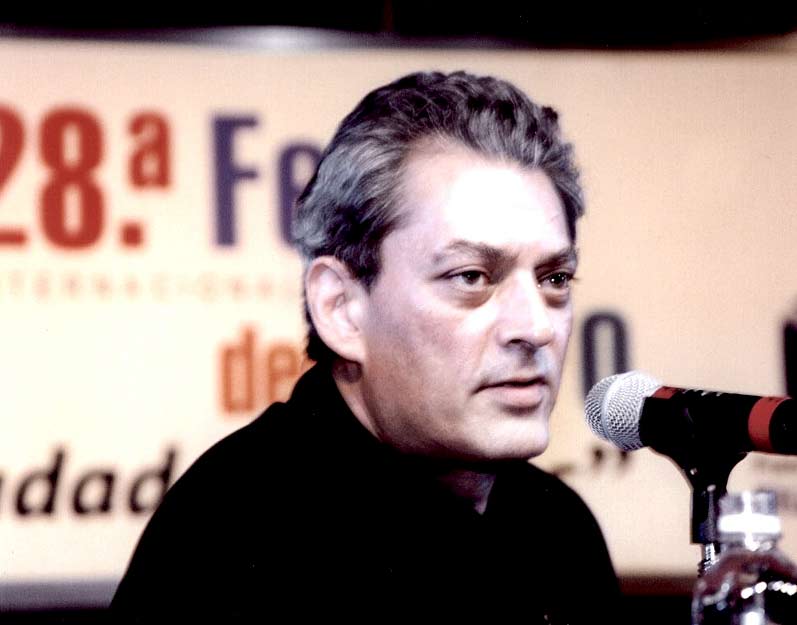
Cultural Events and Controversial Writers
Cultural events include a poetry festival, a storytelling marathon, an interactive area for youth, and a party with games and live shows.
Previous additions have hosted writers such as Paul Auster, Ray Bradbury, Tom Wolfe, Susan Sontag, and Muhammad Yunus.
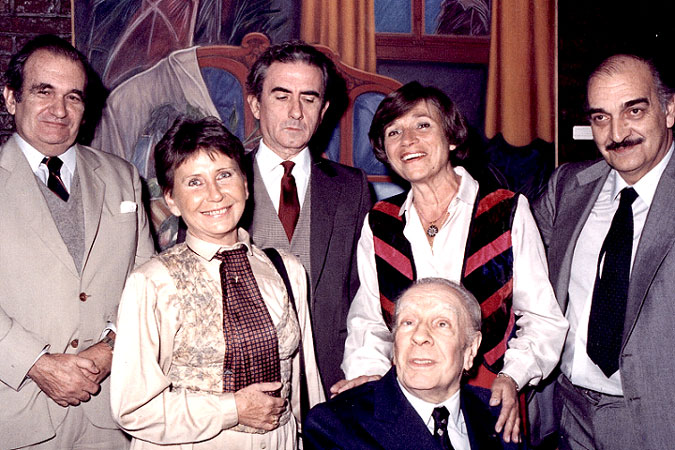
Argentina’s most renowned contemporary authors also attend.
Before their deaths, participants included some of Argentina’s literature greats: Jorge Luis Borges, Ernesto Sabato, Silvina Bullrich and Tomás Eloy Martínez.
Buenos Aires’ largest cultural event has also been the center of some newsworthy incidents over the years.
In 2010 Cuban dissident, Hilda Molina was interrupted by pro-Castro activists chanting, “Cuba yes! Yankees no!” before she was able to make a presentation of her autobiography, Mi Verdad (My Truth).
A shouting match ensued and a member of the public took the microphone and told the protestors to “go to Cuba if they loved Castro so much.”
In 2011 a public outcry emerged when the anti-Kirchner Nobel prize winner, Mario Vargas Llosa was invited to inaugurate the fair.
The controversy played out in the daily newspapers until President Fernández de Kirchner stepped in herself to ask her supporters to withdraw their protests.
Mario Vargas Llosa returned in 2016 and will again be at the book fair this year.
Yearly Themes
Each year the Feria del Libro has a unique theme although it seems they have done away with that year, struggling to organize the festival after the pandemic.
It’s always a large event and organizers this year hinted to behind-the-scene difficulties in their press release, as the event has become more politicized.
The themes keep it interesting for those who attend the fair every year and reflect the era of the fair.
The 2012 theme, ‘The Future of Books’ featured a popular digital space where visitors were able to sample e-readers and purchase electronic books – a practice that is still warming to most Argentines ten years later.
2013’s theme was ‘Libros como Puentes’ or ‘Books as Bridges’. If the theme is a bit recondite, it sheds light on a new development at the Feria del Libro: a city as an honored invitee.
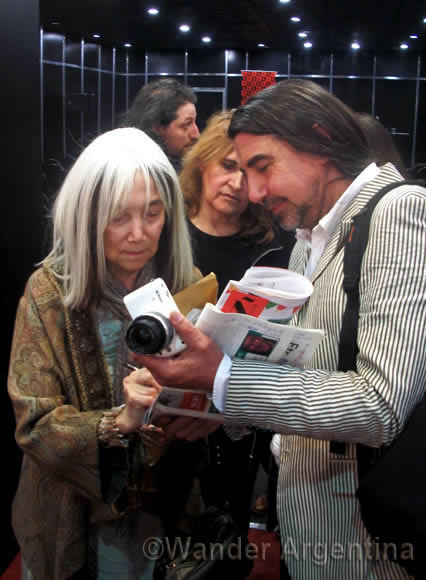
The late Maria Kodama
The late Maria Kodama, Jorge Luis Borges’ widow was a regular at the Buenos Aires Feria del Libros.
The Feria del Libro’s first invited city was Amsterdam and although a principal section of the book fair was dubbed ‘Cafe Amsterdam,’ it did not resemble the aromatic cafes of the famous liberal city.
In the feria’s last edition, the guest city was Montevideo, right next door in neighboring Uruguay.
Ex-president and vice president, Cristina Kirchner was the featured guest of the 2019 Feria del Libro to present her bestselling book, ‘Sinceramente‘ (Sincerely).
The controversial appearance had undertones of a campaign bid to run for President, and that wasn’t far off — later that year she became Vice President.
In her speech at the Feria del Libro, Kirchner criticized Argentina’s neoliberal government of the time and praised then-U.S. president Donald Trump for lowering unemployment by creating more factory jobs.
Kirchner’s speech meant one more kerfuffle for the Feria del Libro history book, as more chaos ensued when Cristina Kirchner supporters surrounded and harassed a journalist working for one of Argentina’s major daily newspapers.
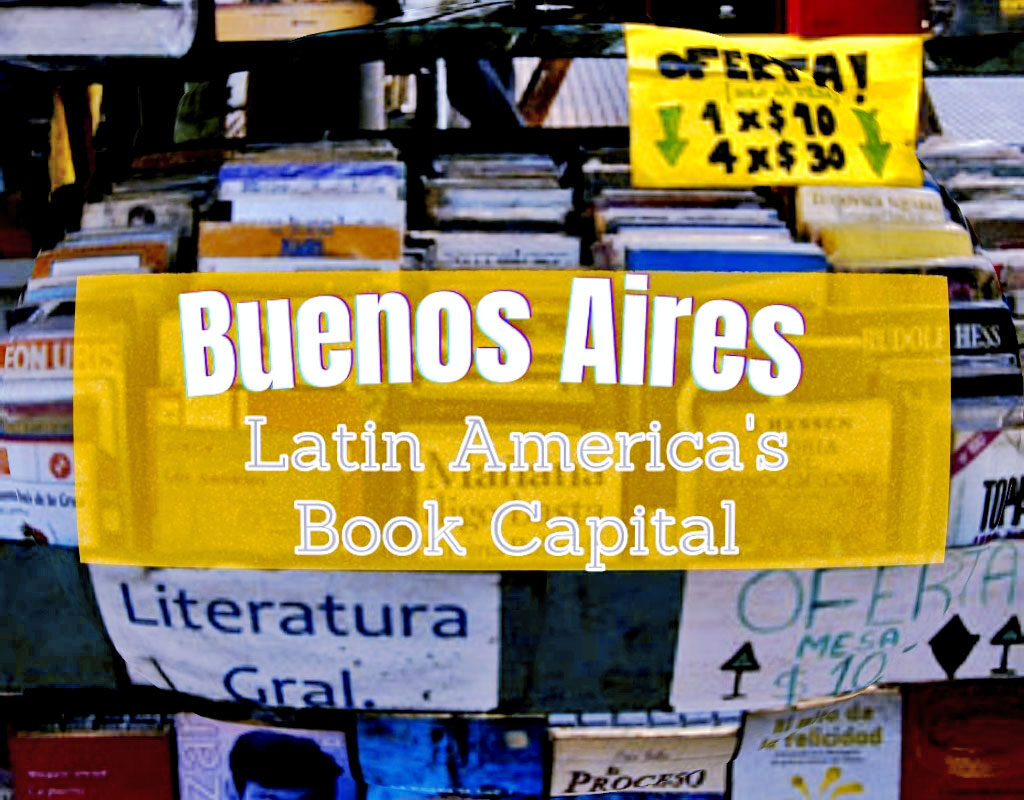
Read about Buenos Aires Love of Literature & Discover the 10 Best Books set in Buenos Aires ➡
A Controversial Start to the First Fair After the Pandemic
Crowds were anxious to see the festival return this year after the two-year break and it was lively from the second doors opened.
A Controversial Start to the First Fair After the Pandemic
The Feria del Libro’s 2022 invited city was Havana, Cuba a choice that is obviously a statement for those familiar with Argentine politics and the fair’s past controversies.
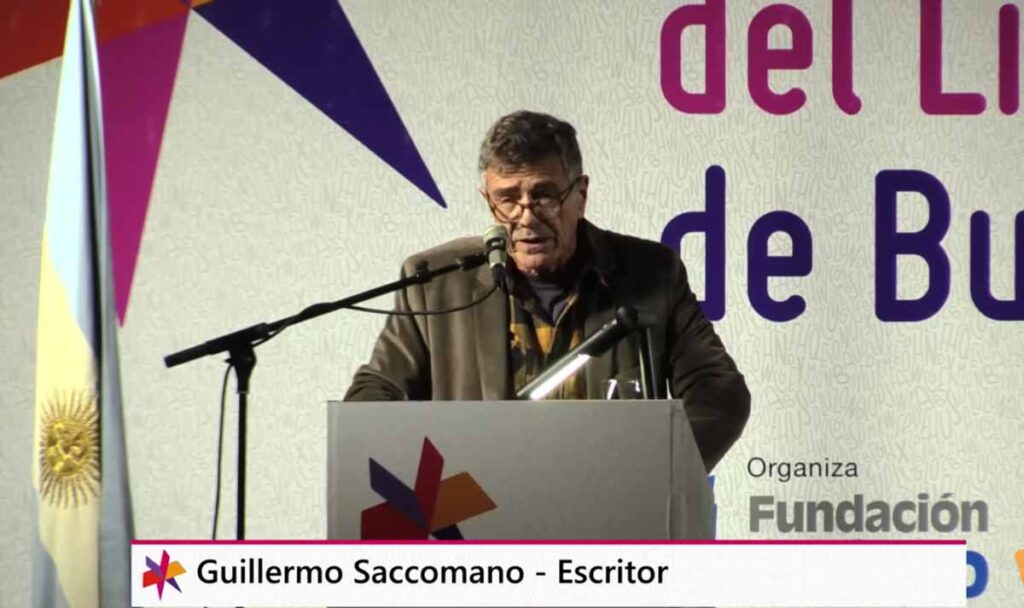
The sometimes controversial book fair got off to a spicy start with a provocative inauguration speech by National Literature Award Winner, Guillermo Saccomanno.
He decided to air some grievances in his inaugural address.
He began with the words, “Some of you aren’t going to like this..”
He went on to tear down everything from Argentina’s paper manufacturers to the high poverty rate, what he said were empty literacy campaigns and the very venue where the event was taking place — La Rural, run by a group who was complicit with the last dictatorship.
All these questions were tied into his main argument: that the Feria del Libro has become a commercial event benefitting publishers, not a cultural event benefiting writers.
Saccomano’s speech went viral in Buenos Aires and received lots of criticism, not the least because he earned over AR$250,000 (US$1250) for the presentation slamming the Fair itself.
The Book Fair’s 2023 Controversies
While according to local news (link in Spanish), there continues to be a power struggle behind the scenes at the Feria del Libro, the 48th edition will take place at La Rural between Apr 25 – Mon, May 13, 2024.
In 2023 the fair’s general director, Ezequiel Martínez, said in that the fair is a space for pluralism and the confrontation of ideas but also took a firm stance against those who might use the event to downplay the atrocities of past dictatorships in Argentina.
This speech was met with strong applause from the audience, indicating support for the fair’s stance on democracy and freedom of expression, yet also setting the scene for a politically charged cultural event where the future president would later offer an opposing view.
This was highlighted because 2023 marks forty years since the return of democracy to Argentina after the Dirty War.
Argentine novelist and University of Buenos Aires literature professor, Martín Kohan inaugurated last year’s fair.
His second novel to be translated into English, ‘School for Patriots’ won the Herralde Novel Prize in Spain.
Santiago, Chile was the invited city and the ambassador of Chile, Bárbara Figueroa was an invited guest.
Santiago was the guest city because 2023 marked fifty years since the deadly U.S.-backed coup d’etat in Chile which overthrew the democratically elected President, Salvador Allende.
Javier Milei’s Speech at the 2023 Book Fair
Recent accusations of plagiarism in his book, including lifting from the works of Gita Gopinath, first deputy managing director of the International Monetary Fund were beleaguering him at the time. Awkard.
Nonetheless, more than 2,000 people filling the largest presentation room in La Rural, where Milei voiced his strong criticisms against the political establishment, then still in power.
He advocated for reducing the political control over Argentina’s Central Bank, connecting this to broader themes of economic freedom and governance.
Milei’s speech extended to the topic of inflation, a pressing issue in Argentina, where he highlighted the drastic increase in inflation rates over the years, attributing this trend to the policies of the now-prior administration.
The session got personal when Milei directed harsh criticisms towards José Luis Espert, a fellow economist and former ally, accusing him of betrayal and labeling him a ‘criminal’ for aligning with the country’s Republican coalition (Juntos por el Cambio).
Some supporters responded with chants supporting his presidential candidacy.
Milei’s Feria del Libro presentation — seven months before his election triumph — highlights the Buenos Aires Book Fair’s increased politicization over the years, with the potential to reshape the national conversation and in this case, the whole political landscape.
2024 Book Fair Details
This year, short-story and novelist, Liliana Heker, will give the inauguration speech on April 25th at 6:00 PM.
On March 21st it was announced that the invited city this year is Lisbon, Portugal.
Alejandro Vaccaro, president of the El Libro Foundation; José Frederico Ludovice, Ambassador of Portugal in Argentina, and Gabriela Ricardes, Minister of Culture of the City of Buenos Aires in attendance for the proceedings.
Writers at the 2024 Feria del Libro
Among the writers who have confirmed their presence at the book fair this year are:
Florencia Bonelli – A Cordoba-born romance writer whose many books are aimed at helping women live a free sexual life.
Mariana Enríquez – Argentine author of short stories and novels in the genre of Gothic fiction and horror, her most famous work is the short story collection ‘Things We Lost in the Fire,’ translated and published in English by Portobello books.
Martín Kohan – A novelist, and short story writer who first gained recognition with his novel ‘Segundos Afuera‘ which deals with the aftermath of the Falklands War. His best-known novel, ‘Ciencias morales’ was adapted into the film ‘La Mirada Invisible.’ Two of his novels are available in English: ‘School for Patriots’ and ‘Seconds Out.’
Gabriel Rolón – A writer, journalist and practicing psychoanalyst known to many Argentines for his work on radio and TV, he authored the 2007 bestseller, Historias de diván and many other books.
Darío Sztajnszrajber (also known as Darío Szeta)- An Argentine philosopher and essayist, he has published works analyzing popular culture and mass media through a philosophical lens. He mashes up philosophy with rock and roll, erotica and even marijuana — he’s had a column in the cannabis magazine ‘THC’ since 2016.
Tamara Tenembaum – A journalist and non-fiction writer, brought up as an Orthodox Jew in the Once neighborhood, in 2021 she published the semi-autobiographical, “Todas nuestras maldiciones se cumplieron.’ Uruguay’s El Observador called her one of the fresh voices of Argentina’s Fourth Wave of feminism.
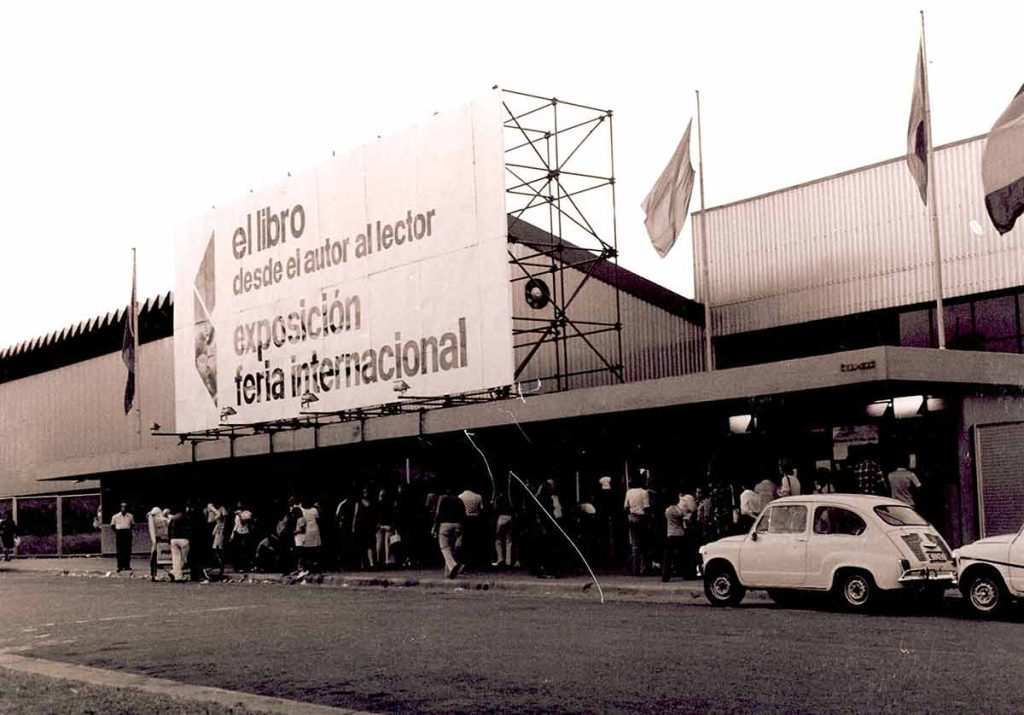
Javier Milei to Speak Again in 2024
The president will present his book ‘Capitalismo, socialismo y la trampa neoclásica‘ (‘Capitalism, Socialism and the Neoclassical Trap’) on May 12 at 4:30 p.m.
The talk will take place in the Central Ring of La Rural, with a capacity for 6,000.
Milei made it clear that he’s at odds with organizers, stating that the Book Fair demanded 300 million pesos from him to sell his book at the fair, a cost presumably covered by the fair’s cultural budget.
How to Buy Tickets for the 2024 Feria del Libro
Tickets for the 2024 Book Fair can be purchased online through the official website or at the on-site box offices in La Rural starting April 25th.
Ticket Options:
- Weekdays (except May 1st): $3,500
- Weekends and Holidays: $5,000
- 3-Visit Pass (online only, non-transferable, one entry per day): $7,500
On Saturday, April 27th, which is Book Fair Night, entry will be free starting at 8:00 p.m. and it will be open until 12:00 a.m.
UPDATE: The Feria del Libro is now free in the evenings for the remainder of the fair
When To Go To Avoid Crowds
The best time to stroll around the Feria del Libro to avoid the crowds and comfortably browse is during the week, particularly during the day.
For special events show up early to get a good spot.
See the schedule of events on the link below.
The end of the festival is a good time for book buyers as visitors can get great deals on books from vendors who want to unload their stock before returning home.
—Alana Fichman

Feria International del Libro de Buenos Aires
Apr 25 – Mon, May 13, 2024
Palermo’s La Rural Fairgrounds/Argentine Rural Society
Santa Fe 4201
or Sarmiento 2704 (parking)
Hours:
◦ Mondays through Fridays 2 p.m. until 10 p.m.
◦ Saturdays & Sundays 1 p.m until 10 p.m.
Tickets:
• Can be purchased at the venue
Mon-Thur – AR$
Fri, Sat, Sun & Holidays –AR$$
Children under 12 free
Getting there:
Subway: Plaza Italia stop, line ‘D’
Buses: 10, 12, 15, 21, 29, 34, 36, 37, 39, 41, 55, 57, 59, 60, 67, 68, 93, 95, 111, 118, 160, 161, 188, 197
